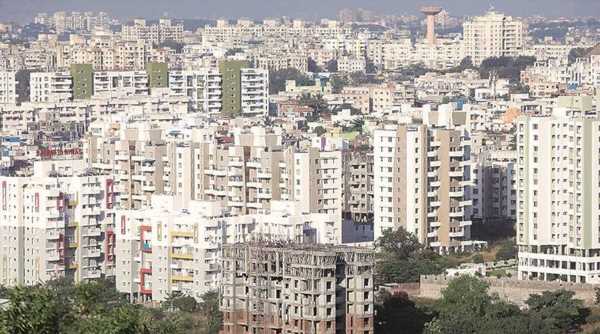The residential rental landscape continued to witness negative growth to the tune of three percent on a year-to-year basis due to high vacancy levels in the wake of the second wave of the pandemic, a study noted
The average property price in Bengaluru has remained stagnant from April to June in comparison to the same in the first three months of 2021, a report based on a recent survey carried out in the Karnataka capital has found.
According to Insite, the quarterly real estate report by property portal 99acres, the rise in Covid-19 infections during the second wave of the pandemic shelved real estate deals to a great extent. The study also revealed that the restriction in movement amid lockdown till mid-June plummeted site visits as well.
Citing the report, Maneesh Upadhyaya, Chief Business Officer of 99acres said site visits, home enquiries and sales volume saw a drastic dip during April and May as opposed to a reviving first few months of the year. “Responses on 99acres went down by over 25 per cent in Apr-Jun 2021 against the previous quarter. Owner listings, too, saw a 5 per cent degrowth as seller community echoed the uncertain and grim market sentiment,” he said.
With the same inching towards revival yet again after lockdown restrictions dropped in June, the portal has been witnessing an upward trend in both owner listings and responses, Upadhyaya added.
Meanwhile, realtors in the city admit that the second wave impacted their operations in an adverse manner. “Like in other sectors, the second wave caused ripples across the real estate industry as well. The relative ease of restrictions in construction activities and digitization of processes enabled us to sustain our operations during this turbulent time,” Ashish R Puravankara, Managing Director, Puravankara Limited told The Indian Express.
He noted that there has been a sharp increase in demand within the smart and affordable housing segment. “Customers are now more open to explore intelligent homes that offer them safety, comfort, and greater control. We are optimistic about the trajectory of this segment and will actively contribute to its growth,” he said.
Hybrid working fuels demand for ‘holistic’ homes
“With work-from-home (WFH) culture in continuation, demand for bigger homes remained relatively higher in Bengaluru. The city also recorded a surge in enquiries for villas and 3 BHK homes,” the study noted.
Corroborating the same, Reeza Sebastian Karimpanal, President (Residential Business) of Embassy Group, ascertained that consumer preferences have changed with homebuyers now keen on a holistic living experience, keeping both sustainability and wellbeing at the centre. “Developers should design homes now ensuring that the space is multi-functional with dedicated workspaces, and silent zones or relaxation areas. A focus on good ventilation, lighting, and ample green spaces also has a significant impact on an individual’s well-being,” she said. Karimpanal added that WFH has also influenced consumers to be open to move to peripheries to upgrade for better homes.
Incidentally, the 99acres report specifically mentioned that enquiries were on the rise in micro-markets including Devanahalli, Hebbal, Yelahanka, Hennur, Thanisandra, Jakkur, Kanakapura Road and Bannerghatta Road areas, within the Rs 80 lakh – 2 cr budget segment. However, Whitefield and Electronic City remained popular among potential homebuyers.
Residential landscape records 3% dip
The residential rental landscape continued to witness negative growth to the tune of three percent on a year-to-year basis due to high vacancy levels in the wake of the second wave of the pandemic, the study noted
“The work from home trend continued to keep a major portion of the migrant population at bay. Many tenants, who had returned to the city a few months back, also gave up their rented houses due to a sudden surge in cases and returned to their hometowns again. Many residential societies placed stringent Covid-19 protocols and restricted the entry of new tenants,” the study indicated noting observations made during April to June.
Source: Read Full Article



